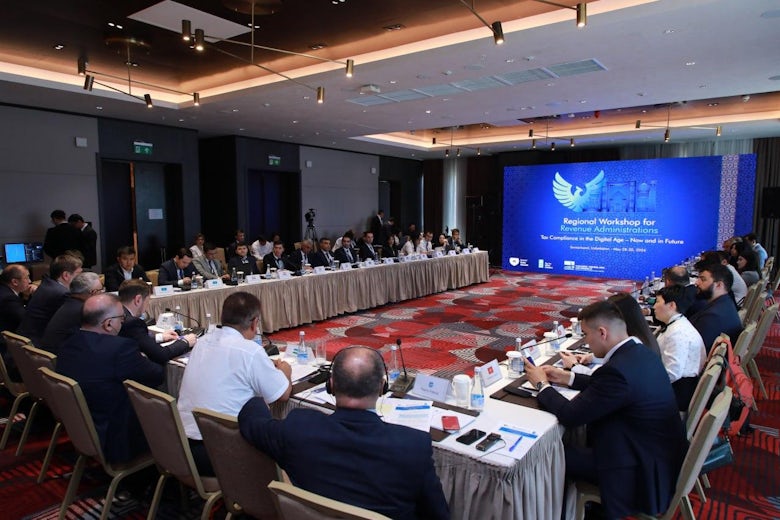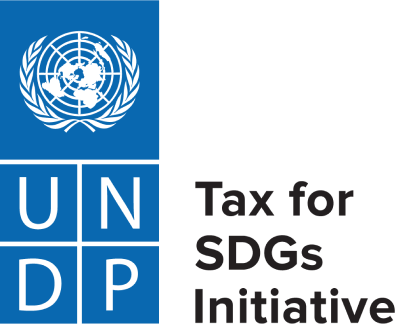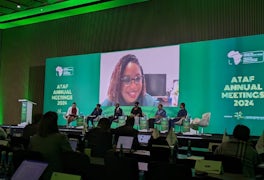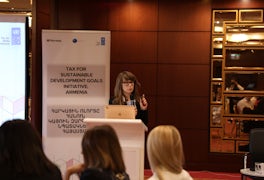Tax Committee of the Republic of Uzbekistan under the Cabinet of Ministers of the Republic of Uzbekistan and the IMF’s Caucasus, Central Asia, and Mongolia Regional Capacity Development Center (CCAMTAC) together with UNDP “Tax for SDGs in Uzbekistan” project have organized a Regional workshop on “Tax Administration: Increasing the level of tax compliance in the digital era - now and in the future” on 28-30 May 2024 in Samarkand.
Workshop has been attended by more than 40 representatives of Tax Administration Offices of Azerbaijan, Armenia, Georgia, Kazakhstan, the Kyrgyz Republic, Mongolia, Tajikistan, Turkmenistan, Uzbekistan, Institute of Fiscal Studies under the Ministry of Economy and Finance of Uzbekistan as well as the IMF, UNDP, and the auditing companies of the Big Four (PricewaterhouseCoopers and KPMG).
The main goal of the workshop was to learn about experience of participant countries in their work towards digitalization of the tax administration, and in particular in the areas of processing large volumes of data ‘Big Data’, as well as application of AI in tax administration practices, e.g. VAT administration. Other sessions of the workshop were dedicated to introduction of AI in tax administration and further digital transformation of the tax administration in Caucasus, Central Asia and Mongolia. Practical activities of the seminar included 10 sessions that allowed to study experience and prospects for regional economic development.

Representatives of “Tax for SDGs” project in Uzbekistan chaired the panel discussion on “Revenue mobilization and the development agenda – the role of taxation in achieving Medium Term Revenue Strategy and Sustainable Development Goals”. Mr. Jafar Fazilov, National Coordinator of the Tax for SDGs Project in Uzbekistan presented the main objectives of the initiative and the results achieved so far. Project expert Dr. Amna Khalifa explained how SDG Taxation Framework diagnostic tool can support countries with increasing potential to raise domestic revenues. It should be noted that SDG Taxation Framework (STF) has been developed by “Tax for SDGs” project and serves as a comprehensive methodology designed for national governments to optimize the alignment of a country’s tax system with the SDGs. Meanwhile, “Tax for SDGs” project’s health taxation expert Mr. Odd Hanssen demonstrated how taxation and tax policies could help achieving specific goals in gaining improvements of SDG 3 (Good Health and Well-being) in Uzbekistan. He also informed the participants about recent health taxation mission to Uzbekistan, related to policy advocacy on implementation of excise tax on sugary carbonated drinks. Overall, the session articulated taxation as a critical tool to accelerate SDG progress and reflected how the “Tax for SDGs” global initiative supports 25 focus countries across the globe.
This event provided a unique platform for peer-assisted learning and knowledge and tax reform sharing experiences between the tax policy and administration practitioners, scholars and private consulting companies. The workshop helped to formulate unified understanding of national tax policy goals, that would meet international standards and, as a result, improve the investment environment of our country and develop economic cooperation between the revenue administrations of participating countries.
The event also provided a good opportunity to improve the awareness and knowledge of the workshop participants on SDGs and how the taxation and tax policies could affect behavioral changes that contribute to desired outcomes, such as environmental sustainability, improved healthcare, gender equality, and broader achievement of the Sustainable Development Goals (SDGs).
Regional workshop also opened new avenues for expanding the cooperation between the IMF and UNDP, that goes beyond the frontiers of a particular country and focus on strengthening the capacities of several countries of the region through organization of workshops, conferences and other events in various areas of mutual interest including public finance management, SDG financing, fiscal policies and tax administration, green transition and introduction of innovative financing instruments.





